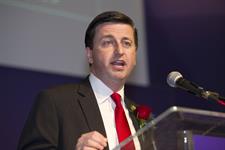An independent inquiry has rejected claims of bullying and improper conduct against the former chair of Unicef UK made by the charity’s former executive director.
Third Sector revealed in September that Sacha Deshmukh had resigned from the charity after five months in the role, alleging that he had been subjected to bullying behaviour by Douglas Alexander.
Former government minister Alexander, who rejected the allegations, also stepped down in order to allow an investigation into the claims to take place.
A summary of the findings of the review, which was carried out by the law firm Morgan, Lewis & Bockius UK, has been published today.
Reviewers interviewed more than 30 people over a seven-week period and additional information was received from the interviewees and others, the summary says.
It says Alexander and Deshmukh, who had scheduled weekly calls and other conversations as needed, had two “heated conversations” over a five-month period.
It says Deshmukh had said he increasingly found Alexander’s manner and conduct during their conversations to be challenging, which he felt amounted to bullying.
But the summary says: “There is no evidence, apart from Sacha Deshmukh’s account, that indicated there was bullying behaviour by Douglas Alexander towards Sacha Deshmukh.
“The evidence received from others and the contemporaneous communications suggest there was a warm and professional relationship between the two of them.”
The review concludes that Alexander’s conduct did not amount to bullying.
The summary says that between 27 June 2018 and late September 2019, three Unicef UK staff members informally raised issues about Alexander’s conduct, mainly relating to one-to-one dealings between him and the three individuals.
But the review concludes: “Apart from some tense moments in a meeting (that was described by attendees as a difficult meeting) where Douglas Alexander’s conduct was seen to be assertive and curt, and one occasion where he was seen to have a heated discussion with a senior United Kingdom Committee for Unicef person, nobody witnessed any behaviour which could amount to bullying.”
It says that although the staff members “clearly did experience discomfort in dealing with Douglas Alexander and found his approach upsetting to them”, the behaviour did not amount to bullying.
The review also rejected claims that Deshmukh had made protected disclosures under whistleblowing legislation.
It says Alexander worked with another trustee to respond to media queries in the immediate wake of Deshmukh’s resignation.
But this should not have not have been allowed to happen, the review says, because there was a potential conflict of interest, “or at least the risk or a perception of one”, between his position and the charity’s best interests.
Alexander said in a statement: “I am pleased but not surprised that I have been exonerated by this thorough and independent review rejecting the allegations of bullying and improper conduct made against me.
“The findings of the review confirm that these false allegations briefed to the media were without foundation.
“While it has been distressing for me to have my reputation attacked in this way, after an unblemished record of public service, of greater concern has been the impact these false allegations have had on the dedicated staff and important mission of Unicef UK.
“It is deeply regrettable that these allegations, that have been confirmed as baseless, have been aired in a way that has caused so much cost, disruption and adverse publicity to an organisation undertaking vital work for the world’s children.”
Unicef UK said in a statement that it had “reviewed and strengthened policies and processes and will continue to examine further best practice in light of the review”.
Shatish Dasani, interim chair of Unicef UK, said: “We will be learning from the findings of this independent external review to ensure that we can fulfil our purpose of supporting Unicef’s mission to protect the rights of every child, everywhere.
“The board and management are committed to a safe, inclusive and enabling work environment in support of our work for children.”
